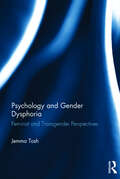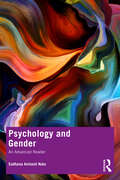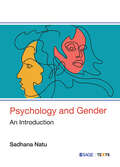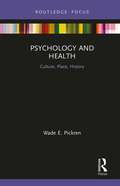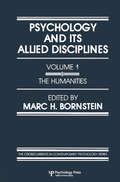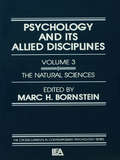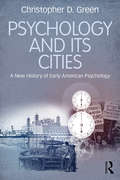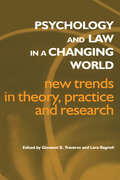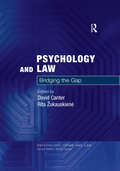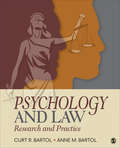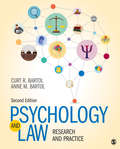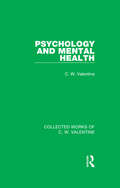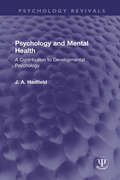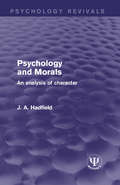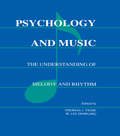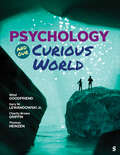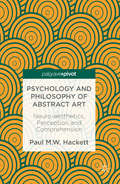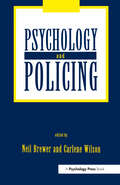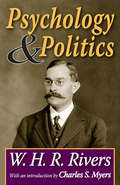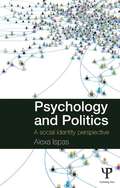- Table View
- List View
Psychology and Gender Dysphoria: Feminist and Transgender Perspectives
by Jemma ToshPsychiatry and psychology have a long and highly debated history in relation to gender. In particular, they have attracted criticism for policing the boundaries of ‘normal’ gender expression through gender identity diagnoses, such as transvestism, transsexualism, gender identity disorder and gender dysphoria. Drawing on discursive psychology, this book traces the historical development of psychiatric constructions of ‘normal’ and ‘abnormal’ gender expression. It contextualizes the recent reconstruction of gender in the 5th edition of the Diagnostic and Statistical Manual of Mental Disorders (DSM-5) and its criteria for gender dysphoria. This latest diagnosis illustrates the continued disagreement and debate within the profession surrounding gender identity as ‘disordered’. It also provides an opportunity to reflect on the conflicted history between feminist and transgender communities in the changing context of a more trans-positive feminism, and the implications of these diagnoses for these distinct but linked communities. Psychology and Gender Dysphoria examines debates and controversies surrounding psychiatric diagnoses and theories related to gender and gender nonconformity by exploring recent research, examples of collaborative perspectives, and existing feminist and trans texts. As such, the book is relevant for postgraduate and postdoctoral researchers of gender, feminism, and critical psychology as well as historical issues within psychiatry.
Psychology and Gender: An Advanced Reader
by Sadhana Avinash NatuThis book provides an understanding of how psychology and gender are closely interrelated. It examines, critiques, and debunks some of the theoretical premises from mainstream psychology while remaining mindful and respectful of their utilities. The book brings together psychological concepts, theories, and paradigms and examines how they interplay with gender studies going beyond the typical understanding of gender as merely demographic variable. The volume discusses important concepts such as gender role development and interpersonal relationships across caste, class, genders, sexualities, race, and region. It also studies the significant link between psychology and gender and with feminism, women’s studies, the women’s movement, the queer movement, queer studies, as well as other social movements. It uses an interdisciplinary and multidisciplinary approach all through. This book will appeal to students, researchers, and teachers of psychology, applied psychology, gender and women studies, sociology, practitioners, activists, those working in not-for-profit organizations and those working specifically on engendering psychology. The book will also be valuable reading for those interested in South Asian studies and other interdisciplinary courses in social sciences.
Psychology and Gender: An Introduction
by Sadhana NatuA first-of-its-kind textbook, which provides an understanding of the connection between psychology and gender, and their impact on each other. The field of 'psychology and gender' is an uneven, contentious and contested terrain, and the book tries to engage the readers with this challenging field. Going beyond treating 'gender' as a mere demographic variable, it talks about the impact of gender on various branches of psychology and unpacks themes, debates and controversies related to these concepts. Psychology and Gender: An Introduction also examines, critiques and debunks some of the major theoretical premises of mainstream psychology and looks at how these theories speak to gender- related issues. Besides this, important concepts such as gender role development and interpersonal relationships have been explored through multidisciplinary mode, cutting across qualifiers of caste, class, genders, sexualities, race and region. This textbook will appeal to students of psychology and gender studies, teachers, practitioners and those working specifically on engendering psychology. Key Features: • Underscores intersectional nature of gender, instead of equating it only with women and that too middle-class women • Discussions and explanations offer balanced focus on the global and the local variables and issues • Chapters aided by case highlights, key insights, mid-chapter exercises, illustrations and tables to underscore the complexities and nuances of various concepts and theories
Psychology and Health: Culture, Place, History
by Wade PickrenWeaving together the various foundations of psychology and health into a compelling narrative, this book culturally and historically situates the practice, strengths, and shortcomings of the field. Historian of psychology Wade Pickren traces the development of the relationship of health and psychology through a critical history that incorporates context, culture, and place from the early modern period to the present day. Covering a range of topics and time periods including psychology and health in the nineteenth century; stress in post-World War II USA; and the relationship between body, mind, and emotion in the modern world, Psychology & Health: Culture, Place, and History outlines the journey of an understanding of health rooted in nature, to a commodity governed by the neoliberal values of the marketplace, including an exploration of the roles of self-help, emotions, and resilience. The book closes with an outline of contemporary alternatives in health psychology and points toward a future when, once again, psychology and health are grounded in nature. Throughout, the rich connections across cultures illustrate the importance of cultural variations in understanding health, disease, and treatment. This book is essential reading for scholars and students of health psychology at all levels. It will also be of interest to professionals and practitioners in related fields, as well as those interested in the enduring connection between health and psychology.
Psychology and History
by Cristian Tileagă Jovan ByfordAs disciplines, psychology and history share a primary concern with the human condition. Yet historically, the relationship between the two fields has been uneasy, marked by a long-standing climate of mutual suspicion. This book engages with the history of this relationship and possibilities for its future intellectual and empirical development. Bringing together internationally renowned psychologists and historians, it explores the ways in which the two disciplines could benefit from a closer dialogue. Thirteen chapters span a broad range of topics, including social memory, prejudice, stereotyping, affect and emotion, cognition, personality, gender and the self. Contributors draw on examples from different cultural contexts - from eighteenth-century Britain, to apartheid South Africa, to conflict-torn Yugoslavia - to offer fresh impetus to interdisciplinary scholarship. Generating new ideas, research questions and problems, this book encourages researchers to engage in genuine dialogue and place their own explorations in new intellectual contexts.
Psychology and Its Allied Disciplines: Volume 1: Psychology and the Humanities
by Marc H. BornsteinFirst published in 1984. Routledge is an imprint of Taylor & Francis, an informa company.
Psychology and Its Allied Disciplines: Volume 3: Psychology and the Natural Sciences
by Marc H. BornsteinPublished in 1984, Psychology and its Allied Disciplines is a valuable contribution to the field of Developmental Psychology.
Psychology and Its Cities: A New History of Early American Psychology
by Christopher D. GreenWithin the social and political upheaval of American cities in the decades surrounding the turn of the 20th century, a new scientific discipline, psychology, strove to carve out a place for itself. In this new history of early American psychology, Christopher D. Green highlights the urban contexts in which much of early American psychology developed and tells the stories of well-known early psychologists, including William James, G. Stanley Hall, John Dewey, and James McKeen Cattell, detailing how early psychologists attempted to alleviate the turmoil around them. American psychologists sought out the daunting intellectual, emotional, and social challenges that were threatening to destabilize the nation’s burgeoning urban areas and proposed novel solutions, sometimes to positive and sometimes to negative effect. Their contributions helped develop our modern ideas about the mind, person, and society. This book is ideal for scholars and students interested in the history of psychology.
Psychology and Law
by Andreas KapardisFully revised and expanded, this third edition of Psychology and Law: A Critical Introduction is a discussion of contemporary debates at the interface between psychology and criminal law. Features new sections on restorative justice, police prejudice and discrimination, terrorism and profiling offenders. Other topics include critiques of eyewitness testimony, the role of the jury, sentencing as a human process, the psychologist as expert witness, persuasion in the courtroom, detecting deception, and psychology and the police. Each chapter is supported by case studies and further reading. Andreas Kapardis draws on sources from Europe, North America and Australia to provide an expert investigation of the subjectivity and human fallibility inherent in our systems of justice. He suggests ways for minimising undesirable influences on crucial judicial decision-making. International and broad-ranging, this book is the authoritative work on psycho-legal enquiry for students and professionals in psychology, law, criminology, social work and law enforcement.
Psychology and Law in a Changing World: New Trends in Theory, Practice and Research
by Giovanni B. Traverso Lara BagnoliCriminal psychology, and its relationship to the practice of law, has become a topic of major significance over the last three decades. Psychologists play a key role in modern criminal investigation and are central to crime reduction measures such as offender profiling, delinquency prevention and tackling fear of crime. Contributors from North America, Europe and Australia examine this link, both adding to and drawing upon the pool of recent theory construction and empirical work in the following areas: * causes and prevention of offending * studies of crime and offenders * the victim's perspective * witnesses and testimony * studies of legal processes. These issues are studied from a 'local' perspective that recognises not only the need for cross-national comparative research, but also the generation of a corpus of scientific knowledge more representative of the complexity of criminal and legal investigation today.
Psychology and Law: Bridging the Gap (Psychology, Crime and Law)
by David Canter Rita ŽukauskieneThis important book captures contemporary attempts to build bridges between the two very different disciplines of law and psychology and to establish the true nature of the interaction between the two. Including international contributions from lawyers, psychologists, sociologists and criminologists, the book bridges the inherent gap between the practice of law and the profession of psychology at an international level. It throws light on how psychology connects with, inter alia, the courts, prisons, community care, clinics, long-stay hospitals, police investigations and legislative bodies. More recent contributions of social science to legal proceedings are also covered, such as the liability that arises from lack of crime prevention, or the systematic prediction of likely violence by an offender. The book will be essential reading not only for academics and professionals in psychology, the law and related disciplines wishing to understand the broadening base of psychology within the legal process, but also for students trying to form an understanding of the emerging science and the associated career opportunities for this exciting field.
Psychology and Law: Research and Practice
by Anne M. Bartol Curtis R. BartolPsychology and Law offers the definitive perspective on the practical application of psychological research to the law. Authors Curt R. Bartol and Anne M. Bartol emphasize the various roles psychologists and other mental health professionals can play throughout the text. Insight is offered into the application of psychology in criminal and non-criminal matters. Topics such as family law, insanity, police interrogation, jury selection and decision making, involuntary civil commitment, and various civil capacities are included. This comprehensive text examines complex material in detail and explains it in an easy-to-read way. The authors emphasize the major contributions psychological research has made to the law, and encourage critical analysis through examples of court cases, high-profile current events, and research. “The writing is concise and student-friendly. . . . The text incorporates contemporary cases and information and maintains a good balance between the important issues in psychology and law.” —Barbara Abbott, New England College
Psychology and Law: Research and Practice
by Anne M. Bartol Curtis R. Bartol"I like the use of research and citations throughout the text. It is more comprehensive than my current text and does a much better job of presenting the scientific evidence." —Kathy McGuire, Western Illinois University Written by authors with extensive experience in the field and in the classroom, Psychology and Law: Research and Practice, Second Edition, offers the definitive perspective on the practical application of psychological research to the law. Curt R. Bartol and Anne M. Bartol emphasize the various roles psychologists and other mental health professionals play in criminal and civil legal matters. Topics such as family law, mental health evaluations, police interrogation, jury selection and decision making, involuntary civil commitment, and various civil capacities are included. The authors also emphasize the major contributions psychological research has made to the law and encourage critical analysis through examples of court cases, high-profile current events, and research. This comprehensive book examines complex material in detail and explains it in an easy-to-read way. New to the Second Edition: The new edition has been significantly reorganized to more closely align with the progression through the court system. A new chapter on children, adolescents, and criminal law (Chapter 8) provides students with information on adjudicative competence, comprehension of constitutional rights, and eyewitness identification and courtroom testimony. New feature boxes include case studies, research projects, and contemporary topics with discussion questions for classroom debate. Additional court cases and statutes have been integrated into chapters to emphasize the important role psychology plays in the legal process. The content is applied to real cases such as the Masterpiece Cakeshop case and the Dassey confession (comprehending Miranda). Over 300 recent research findings on topics related to psychology and law highlight cutting-edge research studies that help students understand what research does and prompt them to discuss the methodology and results. New pedagogical tables clearly illustrate complex information around ethical issues, APA amicus briefs, strengths and weaknesses of simulation studies, insanity standards within the states, effects experienced by survivors of traumatic incidents, and more. Increased coverage of contemporary issues encourage critical thinking and active learning by promoting discussions around current issues such as telepsychology, neuropsychology, adversarial allegiance, and actuarial instruments used in bail and sentence decision-making.
Psychology and Law: Research and Practice
by Anne M. Bartol Curtis R. Bartol"I like the use of research and citations throughout the text. It is more comprehensive than my current text and does a much better job of presenting the scientific evidence." —Kathy McGuire, Western Illinois University Written by authors with extensive experience in the field and in the classroom, Psychology and Law: Research and Practice, Second Edition, offers the definitive perspective on the practical application of psychological research to the law. Curt R. Bartol and Anne M. Bartol emphasize the various roles psychologists and other mental health professionals play in criminal and civil legal matters. Topics such as family law, mental health evaluations, police interrogation, jury selection and decision making, involuntary civil commitment, and various civil capacities are included. The authors also emphasize the major contributions psychological research has made to the law and encourage critical analysis through examples of court cases, high-profile current events, and research. This comprehensive book examines complex material in detail and explains it in an easy-to-read way. New to the Second Edition: The new edition has been significantly reorganized to more closely align with the progression through the court system. A new chapter on children, adolescents, and criminal law (Chapter 8) provides students with information on adjudicative competence, comprehension of constitutional rights, and eyewitness identification and courtroom testimony. New feature boxes include case studies, research projects, and contemporary topics with discussion questions for classroom debate. Additional court cases and statutes have been integrated into chapters to emphasize the important role psychology plays in the legal process. The content is applied to real cases such as the Masterpiece Cakeshop case and the Dassey confession (comprehending Miranda). Over 300 recent research findings on topics related to psychology and law highlight cutting-edge research studies that help students understand what research does and prompt them to discuss the methodology and results. New pedagogical tables clearly illustrate complex information around ethical issues, APA amicus briefs, strengths and weaknesses of simulation studies, insanity standards within the states, effects experienced by survivors of traumatic incidents, and more. Increased coverage of contemporary issues encourage critical thinking and active learning by promoting discussions around current issues such as telepsychology, neuropsychology, adversarial allegiance, and actuarial instruments used in bail and sentence decision-making.
Psychology and Life
by Philip G. ZimbardoThe classic text that defined the field, Psychology and Life, Fifteenth Edition, celebrates Phil Zimbardo's 30th anniversary as its author by returning to its original themes: presenting psychology as a science and as a tool to understanding our daily lives. The book continues to provide a rigorous, research-centered survey of the discipline while offering students features and pedagogy that will spark their interest and excite their imaginations.
Psychology and Mental Health (Collected Works of C.W. Valentine)
by C.W. ValentineOriginally published in 1948, this book deals, in a non-technical way, with such topics as Worry and Conflict; Repressions, Irritability and Complexes; Depression, Inferiority and Loneliness; Suggestion and Auto-Suggestion. Each topic is illustrated by reports of actual cases. A series of broadcast talks on these subjects by the author (given in 1946) were so widely appreciated, and so many requests for publication were made, that the talks were expanded and revised so as to be more suitable for reading. Discoveries of the wide prevalence of minor neuroses at the time had led to an increased interest in the subject and the demand for simple exposition. It was also thought that some popular illusions should be dispelled. The talks were designed not only to explain some common mental disorders, but to help some of those numerous individuals who were struggling with difficult mental situations, or were often lonely and depressed.
Psychology and Mental Health: A Contribution to Developmental Psychology (Psychology Revivals)
by James Arthur HadfieldFirst published in 1950, Psychology and Mental Health describes the origin of behaviour disorders and the psychoneuroses especially as regards their causes in early childhood. Most psychologists agree that such disorders as hysteria, sex perversion, the obsessions and anxiety states, as well as many behaviour disorders and delinquencies, find their roots in childhood experiences. If this is the case it should be possible to prevent them from developing into full-blown neurotic disorders which may take years to cure. The purpose of this book is to describe the early causes of these disorders with a view to their treatment, but more particularly with a view to their prevention. As mental health is the concern not only of the doctor but of the parson and the priest, of the teacher and the parent, this book is written in non-technical language as far as the demands of accuracy will allow. It embodies the result of over thirty years’ experience in the treatment of patients suffering from these disorders, and the views here maintained, which differ somewhat from the other analytic schools, are illustrated with clinical examples throughout. This book is a reissue originally published in 1950. The language used reflects its era and no offence is meant by the Publishers to any reader by this republication.
Psychology and Morals: An Analysis of Character (Psychology Revivals)
by J. A. HadfieldOriginally published in 1923, this book had enjoyed constant and wide success, being reprinted fourteen times. In this new and thoroughly revised edition, published in 1964, the author has reconsidered his conclusions in the light of modern psychology of the time, and includes many case histories from his long experience as a psychiatrist. The book was important for its insistence that there is no intrinsic conflict between analytical psychotherapy and ordinary moral behaviour.
Psychology and Music: The Understanding of Melody and Rhythm
by Thomas J. Tighe W. Jay DowlingThis book deals with the complex cognitive processes involved in understanding two "horizontal" aspects of music perception, melody and rhythm, both separately and together. Focusing on the tonal framework for pitch material in melodies, the first section provides evidence that mere exposure to music organized in a particular way is sufficient to induce the auditory system to prepare itself to receive further input conforming to the patterns already experienced. Its chapters also offer evidence concerning elaborations of those basic schemes that come about through specialized training in music. Continuing themes from the first section -- such as the hypothesis that melodies must be treated as integral wholes and not mere collections of elements -- the second section discusses the integration of melody and rhythm. In these chapters there is an underlying concern for clarifying the relation -- central to aesthetic questions -- between physical patterns of sound energy in the world and our psychological experience of them. The chapters in the third section provide excellent examples of the new, scientific literature that attempts to objectively study early musical abilities. Their data establish that infants and young children are far more perceptive and skilled appreciators of music than was thought a decade ago.
Psychology and Our Curious World
by Thomas Heinzen Gary W. Lewandowski Wind Goodfriend Charity Brown GriffinYour students are curious. Here is a text that shows them how psychology answers the questions they are asking. In this introduction to psychology, Wind Goodfriend, Gary Lewandowski, Charity Brown Griffin, and Tom Heinzen investigate our everyday curiosities through psychological science – approaching the discipline′s core tenets with candor, humor, and wonder. Psychology and Our Curious World invites students to ask questions, think critically, and make evidence-informed decisions to better understand their unique world and that of others. Amplifying the impact of their work, all the authors are donating a portion of their royalties to charities close to their hearts, including: The Trevor Project, Thurgood Marshall College Fund, Make-A-Wish Foundation, Wounded Warrior Project, and GlassRoots. This text is offered in Sage Vantage, an intuitive learning platform that integrates quality Sage textbook content with assignable multimedia activities and auto-graded assessments to drive student engagement and ensure accountability. Unparalleled in its ease of use and built for dynamic teaching and learning, Vantage offers customizable LMS integration and best-in-class support. Watch this video walkthrough and see how Vantage works:
Psychology and Our Curious World
by Thomas Heinzen Gary W. Lewandowski Wind Goodfriend Charity Brown GriffinYour students are curious. Here is a text that shows them how psychology answers the questions they are asking. In this introduction to psychology, Wind Goodfriend, Gary Lewandowski, Charity Brown Griffin, and Tom Heinzen investigate our everyday curiosities through psychological science – approaching the discipline′s core tenets with candor, humor, and wonder. Psychology and Our Curious World invites students to ask questions, think critically, and make evidence-informed decisions to better understand their unique world and that of others. Amplifying the impact of their work, all the authors are donating a portion of their royalties to charities close to their hearts, including: The Trevor Project, Thurgood Marshall College Fund, Make-A-Wish Foundation, Wounded Warrior Project, and GlassRoots. This text is offered in Sage Vantage, an intuitive learning platform that integrates quality Sage textbook content with assignable multimedia activities and auto-graded assessments to drive student engagement and ensure accountability. Unparalleled in its ease of use and built for dynamic teaching and learning, Vantage offers customizable LMS integration and best-in-class support. Watch this video walkthrough and see how Vantage works:
Psychology and Philosophy of Abstract Art
by Paul M.W. HackettThis book examines how we perceive and understand abstract art in contrast to artworks that represent reality. Philosophical, psychological and neuroscience research, including the work of philosopher Paul Crowther, are considered and out of these approaches a complex model is developed to account for this experience. The understanding embodied in this model is rooted in facet theory, mapping sentences and partially ordered analyses, which together provide a comprehensive understanding of the perceptual experience of abstract art.
Psychology and Policing
by Neil Brewer Carlene WilsonPsychological theory and research have much to contribute to the knowledge and skill bases underlying effective policing. Much of the relevant information, however, is dispersed across a variety of different psychological and criminal justice/policing journals and seldom integrated for those applied psychologists interested in policing issues or for police policymakers/administrators and others working in the criminal justice area who are not familiar with the psychological literature. Designed to accommodate the needs of these different groups, this book addresses both operational policing issues and issues relevant to the improvement of organizational functioning by providing integrative reviews of psychological theory and research that deal with effective policing. It illustrates how the theory and research reviewed are relevant to specific policing practices. These include eyewitness testimony, conflict resolution, changing driver behavior, controlling criminal behavior, effective interviewing, and techniques of face reconstruction. The volume's readable style makes it accessible to a diverse audience including undergraduate and postgraduate students in forensic/organizational/applied psychology, criminal justice, and police science programs, and police administrators and policymakers. It will also interest psychologists whose primary focus includes policing and criminal justice issues. The book should draw attention to the often unrecognized and valuable contribution that mainstream psychology can make to the knowledge base underpinning a wide variety of policing practices.
Psychology and Politics
by Leston HavensIn applying psychology to the field of politics, the eminent British anthropologist and psychologist W.H.R. Rivers deals with social or collective psychology rather than with the psychology of the individual. This choice presents a number of problems. These include the relation between individual and collective psychology, the concept of a collective or group mind, and the question of how far society can be regarded as an organism. The choice also presents the need to explain the fact that when a number of individuals act together, the product of their combined activity is not the same as what might have emerged from the separate activity of individuals. Rivers' belief in the political process prompted him to deliver the lectures on psychological theory that are printed in this volume. Three other addresses are also included in this volume, one on socialism and human nature, another on education and mental hygiene, and a lecture on the aims of ethnography. Rivers considered the relation between psychology and sociology, putting forward the position that the formulation of an adequate science of social psychology lies in the observation of social conduct, including not merely the social conduct of everyday life, but still those forms of it which are subsumed under the headings of religion, economics, and politics, as well as the social institution of language. The social behavior of mankind is capable of being studied as a methodological principle, independently of the psychological basis of behavior.
Psychology and Politics: A Social Identity Perspective
by Alexa IspasWhat makes us divide the world into ‘us’ and ‘them’? How can we exert social influence over others? When does a peaceful protest turn into a riot? Why are some politicians heroes one day and villains the next? Where do we find the resources to resist authoritarian regimes? Taking these questions as a starting point, the book examines political conduct from a social identity perspective. Supported by over two decades of empirical research, this perspective distinguishes between our personal identity, which is prevalent when we think of ourselves as individuals, and our social identity, which comes to the fore when we think of ourselves as members of groups. The social identity perspective argues that our political behaviour is largely governed by our social identity, and discusses the implications this has for politics, particularly for social influence, crowd events, leadership, and authoritarian regimes. Accessible and engaging, the content covers a wide range of political topics, such as the way in which categorizing ourselves into groups influences how we perceive the social world, the implications of categorization for social influence, the development of crowd events, the dynamics of leadership, and the mechanisms underlying obedience under authoritarian regimes. The book will appeal to advanced undergraduate and postgraduate students across a range of disciplines, as well as to political activists and leaders.
